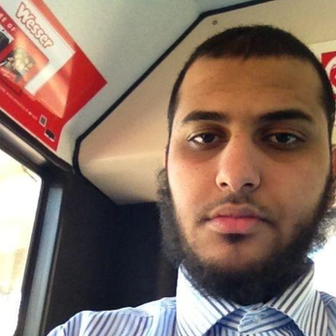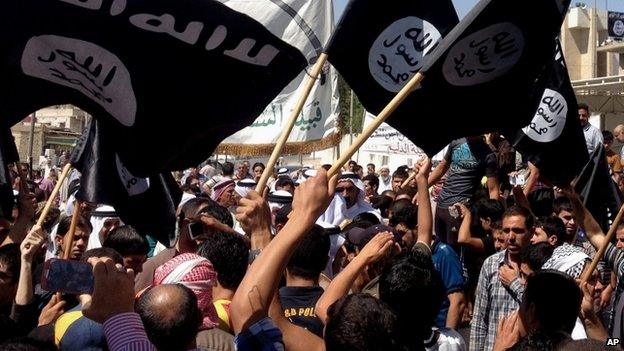Tracking Syria fighters now main task for MI5
- Published
This footage purports to show Reyaad Khan (c) Nasser Muthana (r) from Wales
Tracking British jihadists fighting in Syria is now the top priority for MI5, the BBC has learned.
It comes after a video appeared to show UK jihadis in Syria trying to recruit people to join them there and in Iraq.
The Home Office said counter-terror police were working to get the video - posted by internet accounts linked to Islamic State of Iraq and the Levant (Isis) militants - taken off line.
The father of one of the men in the video said it made him "want to cry".
Nasser Muthana, 20, from the Cardiff area - who has been offered places to study medicine by four universities - appears in the footage using the name Abu Muthanna al-Yemen.

Nasser Muthana's family said they were "heartbroken" he had gone to Syria
Isis has made rapid advances through Iraq in recent weeks.
Prime Minister David Cameron has said its fighters are plotting terror attacks on the UK.
BBC security correspondent Frank Gardner said MI5 was having to prioritise the greatest amount of its casework on tracking British jihadists in Syria.
An estimated 400-500 UK fighters have been recruited by Isis, which has a presence in Syria and is engaged in fierce fighting with Iraqi government forces.
'Propaganda'
The video footage features six armed men, sitting in front of the black flag of Isis.
One of them, a Briton identified as Abu Dujana al Hindi, says he has a "message to the brothers who have stayed behind".
The video cannot be verified, but BBC correspondent Paul Adams said it came from social media accounts with known links to Isis and had probably been filmed in Syria.
"It appears to show British jihadis intent on joining the fight in Iraq," he said.

Isis in Iraq

The rebels now control the northern cities of Mosul and Tikrit
Isis grew out of an al-Qaeda-linked organisation in Iraq
Estimated 10,000 fighters in Iraq and Syria
Joined in its offensives by other Sunni militant groups, including Saddam-era officers and soldiers, and disaffected Sunni tribal fighters
Exploits standoff between Iraqi government and the minority Sunni Arab community, which complains that Shia Prime Minister Nouri Maliki is monopolising power
Led by Abu Bakr al-Baghdadi, an obscure figure regarded as a battlefield commander and tactician

Ahmed Muthana, Nasser's father, told the BBC his son had "disappeared" without saying where he was going.
Asked about the video, he said: "I don't think that's Nasser talking, it's someone else is teaching him to talk like this because the attitude of Nasser is 100% completely different, and I think they're calling for wrong things."
Asked whether his son had been radicalised, he said: "I think so."
Ahmed Muthana, father of Nasser: "Somebody is driving those kids to do this"
It comes a day after the UK government "proscribed" Isis, making it a criminal offence to associate with it or give it financial backing. Four other groups with links to Syria were proscribed at the same time.
Alongside its military advances, Isis has mounted a parallel social media campaign.
Sasha Havlicek, who co-chairs a European Union working group on internet radicalisation, said Isis was using social media to compete with other radical groups.
"I think the strategy that they're putting in play right now is about brand recognition," she told the BBC.
"The point really I think for Isis is about claiming a piece of the market, and they've done that incredibly successfully."

Analysis
Sebastian Usher, BBC Arab affairs editor
In the video, six men sit cross-legged in a semi-circle, with their Kalashnikovs beside them and the black flag of Isis behind. It is unclear where they are. But their message is very clear.
It is a recruitment call for Western Muslims to join their battle, not at home but in Iraq and Syria. One says that jihad is the best cure for the depression which he says Muslims feel in the West.
Isis has established itself as a sophisticated manipulator of social media. The image portrayed is often brutal, intended to sow fear and submission. This is different - the fighters speak softly and smile. It seems aimed at widening the group's appeal.

The Home Office said: "We do not tolerate the existence of online terrorist and extremist propaganda, which directly influences people who are vulnerable to radicalisation.
"We already work closely with the internet industry to remove terrorist material hosted in the UK or overseas."
The Home Office said it wanted to "further restrict access to terrorist material" and use "family-friendly filters" to block other extremist content.
A report by the government's extremism taskforce, external, carried out after the murder of Fusilier Lee Rigby in Woolwich, said it would work with internet companies to "restrict access to terrorist material online which is hosted overseas but illegal under UK law".
A spokesman for the Internet Services Providers' Association, which describes itself as the trade body for the UK's internet industry, told the BBC this was "a very tricky area".
There would be two ways to remove the video, he said - either by asking every company hosting it to take it down, or by asking filtering companies to add it to their web filters.
The spokesman added: "We know the Home Office has been looking at this for a while now, and has not really put forward any concrete plans, which may point to the fact that it's quite difficult."
Twitter said it had guidelines for authorities to request information about individual accounts, as well as rules on "potentially sensitive content".
Meanwhile, the International Centre for the Study of Radicalisation and Political Violence (ICSR) said it did not believe there were British fighters in Iraq.
The ICSR, which uses social media to track jihadists' movements, said so far the only European jihadists fighting with Isis in Iraq were from the Balkans.
The Muslim Council of Britain has condemned the violence of Isis and warned young Britons that travelling to Iraq or Syria "will not help the people of those countries".
Mr Cameron has warned of a threat to the UK if an "extreme Islamist regime" is created in central Iraq, while Downing Street said 65 people had been arrested in the past 18 months for Syria-related jihadist activities.
Meanwhile, Baiji, Iraq's biggest refinery, is surrounded by the rebels, who say they have seized most of Tal Afar airport.
The US has said it will send some 300 military advisers to help the fight against the insurgents.